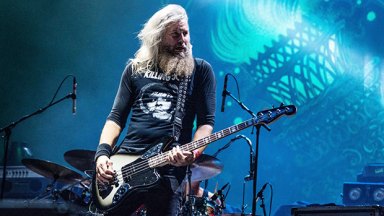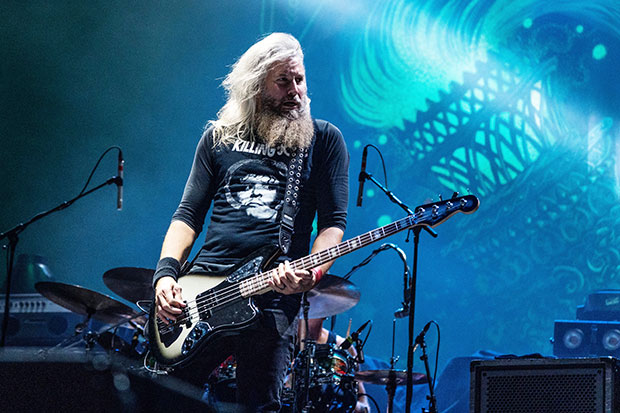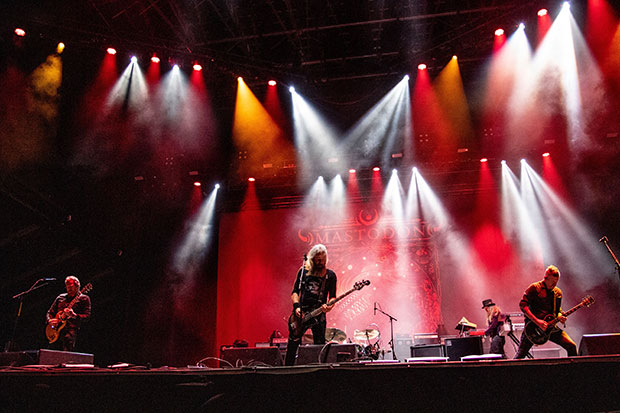
Troy Sanders is, as he puts it, “a believer in omens, yes.” The bassist for Mastodon is speaking with HollywoodLife from the Marriot Burbank Hotel. It is three months before the group’s critically-acclaimed album, Hushed and Grim, celebrates its first anniversary. A few days before the interview, the band – Troy, drummer Brann Dailor, lead guitarist Brent Hinds, and rhythm guitarist Bill Kelliher – released their 90-minute companion documentary, The Making of Hushed and Grim. After our talk, Mastodon will begin on an arena tour with theatrical metal marvels, Ghost. A lot is going on, so seeing “808” on the door could mean something. After all, the number 8 means “abundance, wealth, and achievement” in numerology, and some traditions say 8 is a lucky number.
“I’m going to say no,” says Sanders, brushing aside the notion that staying in a room with the same digits as the Roland TR-808 Rhythm Composer signals his impending fate. “But I do like the fact that when you’re in an elevator and you realize that there’s no 13th floor, but I’ve stayed on the 14th floor,” he explains. “Deep down, I know what floor I’m really on. The same thing with some airlines that don’t have a 13th row. Well, if you’re in row fourteen, and you’re paying attention, you should know where you are.”

Anyone paying attention to pop culture would know that metal has been having a resurgence. Demi Lovato has pivoted to a harder sound with Holy FVCK and has debuted in Billboard Top 10. Evanescence’s nu-metal anthem “Bring Me To Life” surged to No. 1 on iTunes in late August. Metallica‘s “Master of Puppets” and Ghost’s “Mary On A Cross” have made home atop Billboard’s Hot Hard Rock Songs and Hard Rock Streaming Songs charts, respectively. While “Bring Me To Life’s success remains unexplained, the latter two songs’ fortunes are not so much due to the luck found in the number 8 but the power of fandom and TikTok.
“Master of Puppets” was the second-most famous needle-drop in Stranger Things 4, behind Kate Bush’s “Running Up That Hill,” and “Mary On A Cross” was used in a Stranger Things fan video that was so popular that the sound took off on TikTok. Ghost even released an alternative version of the 2019 song for fans to use in new videos.
In the past, such mainstream success might have been balked at by the bullet belts and battle jackets crowd (it still might be by purists who sneer at bands like Ghost, who have enjoyed more commercial success than other acts.) However, Sanders tells HollywoodLife that Mastodon wouldn’t turn down a soundtrack placement or some TikTok fame. “That’s almost every band’s dream,” he says. “is to be like — you’re jamming, you’re working on an album, you’re working on songs, you’re playing gigs, whatever you’re doing — in a perfect world it’d be like, ‘oh, it’d be great if we could just put this song on that TV show, get it in that movie, get it on that video game.'”
“That’s massive, but that’s not really up to the band,” he explains. “That’s up to how hard the band works, the management’s connections, how hard they work. Because the music directors at the football stadium that do Monday night football and the music directors at hockey arenas, the music directors at Stranger Things, those are the ones that reach out and pursue like, ‘Hey, give me something that would fit this.’ Or, ‘Hey, I like that band Slayer. I’d like to use a bit of that.'”
“So it’s a lot of behind the scenes,” he says, “but I mean us, Mastodon, and every other band I could speak for would love to always have a bit — even if it’s an instrumental 10-seconds’ worth on a commercial in a TV show, video game. Absolutely. That’s a whole platform of awesomeness.”
The success also represents a shift in attitudes. No one is accusing Ghost of “selling out” by releasing a new version of a popular song ahead of its and Mastodon’s arena tour. It’s simply pursuing the wealth that numerology attributes to the number 8.
“If you’re authentic to what you’re doing and those opportunities are presented to you, I think it’s incredible,” says Sanders. “If Mastodon said, ‘On our next record, we’re going to go mainstream radio. We got only a few albums left in us.’ Or whatever – the approach was to cater our creative process and our sound specifically to target a new set of fans, to please a certain part of our fan base, or something like that? That is what I don’t care for personally.”
“But,” he adds, “if you’re selected and chosen to be in Game of Thrones or Stranger Things, more power to you, man. That’s incredible.”
If anyone has been paying attention for the last two decades, how a band thrives has radically changed. “I can see how the term ‘sellout’ and the scene’s integrity was definitely more personal to people years ago,” says Sanders, “because if you chose to stay in that underground scene — then, you can, and that’s absolutely fine. But the hardworking bands that toured and tried to make a living at their craft would sell albums, and the landscape of income was far different.”
“In the past 20 years, that’s vastly changed,” he continues. “I’ve made more of my living in the past two years — even though we have been touring — on other things besides the actual touring. So, bands like us and countless others are always looking for a way, if they feel good in their heart by doing it, to have forms of income. I think that view of selling out in that way doesn’t exist nearly to the degree it did before.”
“I saw a couple of years ago an Apple commercial that had a Megadeth song in it,” says Sanders, referring to the 2019 commercial that utilized “Last Rites” to show off the iPhone XS. “I saw it on TV and was like, ‘That’s awesome.’ Did Megadeth write a song to be paired up with Apple? Absolutely not. There’s a car commercial recently that had a Queens of the Stone Age song in it. I’d rather hear Queens of the Stone Age. I’d rather hear Megadeth. I’d rather hear us.”
“Again, we’re not trying to write a song so we could get paired up with a Gatorade commercial, but if Gatorade were smart, we sweat our ass off. They’d come to us,” he says with a smile. “Let them come to us. I understand it’s athletes and skateboarders and such, but hell, if Red Bull or Gatorade approached us, we’d be like, ‘Yeah!'”
“We welcome any opportunities,” says Sanders. “To branch out and have your music on other platforms, then I think is a healthy thing — if done with true integrity and if you keep your soul and spirit intact. I see nothing wrong with it.”

Soul, spirit, and integrity are what Mastodon has had in abundance from its beginning, and those elements have defined the band over the past decade. Though Mastodon secured its spot in metal history with 2004’s Leviathan, an album loosely based on the fictional Moby Dick, the group has built its esteem by processing real-world grief into some of the most stirring metal of the current century. 2009’s Crack The Skye dealt with the loss of Brann’s sister, who died at age 14. The Hunter, in 2011, was a tribute to Brent’s brother, while Bran told Metal Hammer that 2014’s Once More ‘Round The Sun was “rooted in dark days, for sure.”
Hushed and Grim took root in the band’s grief of losing Nick John (their long-serving manager, unofficial fifth member, and dear friend) to cancer in 2018. In such darkness bloomed a terrible brilliance, a double album of mammoth proportions in scale, emotion, and might. Over fifteen tracks, Mastodon weaves elements of cosmic prog, surging thrash, hazy stoner metal, bleary-eyed blues-rock, and speckles of gloom-kissed melodic doom. The seams never show as the band had produced a cohesive experience of grief, sadness, rage, confusion, and acceptance from start to finish.
One element not in Hushed and Grim is humor, which is odd since it’s everywhere in the making-of documentary. Six minutes into the hour-and-a-half feature, the latest behind-the-scenes feature from the band, Troy wakes up in an alley outside the West End Studio where they recorded the album. “Moments of gratitude, that’s how I stay grounded,” Troy said in the doc, wearing a white nightgown while holding up an inflatable eye.
The rest of the documentary – which does chronicle the album’s construction – features moments of gleeful absurdity, both factual and unbelievable. Brann shows off some of the clowns he drew during the pandemic (101 of which he collected into an actual book you can buy.) Bill starts a running cult. Brent is a train-obsessed busker. Troy is a sea captain fishing out perfectly cooked crab legs and lobster tails. These moments are, essentially, really silly.
“We’re obviously very passionate about our music,” Troy tells HollywoodLife, “and all aspects — the song craft and our lyrics subject matter — our livelihoods based around Mastodon. We take that very, very seriously. We’ve built this thing from the ground up, and we’re very proud of it. But outside of that seriousness, we’re a bunch of goofballs.”
“We love cracking jokes,” he continues, “and laughing and being silly, and comedy is our favorite type of movie. So, it’s only natural for us to attempt being funny. It’s absolutely a part of an extension of our individual characters in the band. And I think it’s also very relatable to everyone like, ‘Hey, we’re not just super serious all the time. We take our job, if you will, seriously.’ But when people leave the office and go home, they can be funny people, and they like to grill food, jump in a pool, get naked, and drink a beer or whatever.”
He points out that it’s “important to show that [goofball] side of us too” because it shows that Mastodon is not just doom and gloom. “We’ve been revealing our personal selves to our fan base over the years, and it’s just an extension of that. Let’s lighten it up a little bit. Cause our subject matter is dark,” he says. “And again, that’s relatable to the rest of the world too.”
“We don’t sit around and say, ‘Okay guys, it’s time to work on a new record. What kind of sadness hole can we dive in?’ It’s not like that. It’s like, ‘Hey, what’s going on? This is what’s going on.'”
“Since the beginning of our band, we’ve pulled from those experiences. When we’re sitting down and pinning lyrics, we’ve always tried to take dark, negative emotions and channel them through the band to come out the other end in some type of positive light,” he adds. “Because our music lives forever, once you record it. So it’s helpful to us, personally, and helps us be relatable to anybody who listens to our band.”
Mastodon hopes to gain some new listeners by supporting Ghost on its ongoing arena tour. Troy recounted how following Hushed and Grim, they did a three-week co-headlining tour with Opeth both in the fall of 2021 and spring of this year, went to Europe for June, and “last weekend, we played a gig in Tokyo” that required more traveling time than they were in the country (“We kind of knew that, but we were so excited to have the opportunity to go back to Japan,” he says). The tour runs through the rest of September, concluding in Illinois before the band plays Louder Than Life Festival and Furnace Fest.
“We’re going as big and badass as we can,” he says. There are no plans to change up the setlist to cater to a Ghost crowd. Those attending will get the whole Mastodon experience. “A lot of times,” says Troy, “support bands don’t have the luxury of using all the lights or all the stage or being able to bring in video walls and use lasers — because you can be stealing the thunder of the headlining act. But we have a good relationship with the band Ghost. We’ve toured with them. Our first tour with them was in 2011, so we’ve been friends for over ten years.”
Ghost, who released IMPERA this year, is one of those bands with major crossover appeal, and Troy sees this tour as an opportunity to share his band’s music with a new crowd. ”
We always see Ghost shirts at our shows,” he says. “So I know for a fact there are some similarities in fanbases.” He also notes that he’s seen battle jackets overseas sporting Ghost patches alongside legends like Slayer, Iron Maiden, and King Diamond – high praise in the metal community. “So they are affiliated with heavy metal. Their massive success across mainstream rock radio right now is opening the doors to a slew of young fans.”
“So I would imagine starting tomorrow,” he says of the opening date on the tour, “we’re going to see a lot of ages, eight to eighty, in the crowd. And hopefully, people that don’t know who we are, they’ll walk away – like I have, many times in my life — going, ‘the first band that went on, that was cool! I like that. I’m going to go watch a video of theirs or stream some of their tunes.’ So to the idea of still gaining fans after ten records in 20 years? That’s a good thing.”

Perhaps 808 was an omen, after all. Mastodon will perform its abundance of music to new listeners, achieving greatness (or some applause) and securing a new wealth – even if it’s in the form of new die-hard fans who will adorn their own jackets with patches bearing the band’s name. With a little bit of luck, those fans will make fan-vids scored to “Blade Catcher,” “Asleep In The Deep,” or “Peace and Tranquility,” and the group will go viral. Or 808 is just a bit of lopsided infinity and a place where Troy could sleep before Mastodon’s next show.
Mastodon is on tour now. Click here for dates and details.


